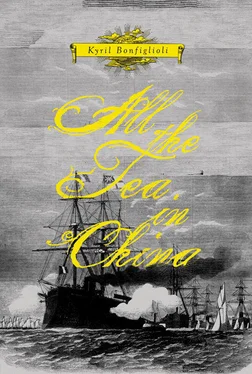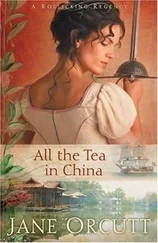“Fat old pig say why you doing here, no at Canton? He say he must cut off all heads by mercy of Emperor.”
“Tell him,” said the Captain, “that we have been blown here by terrible winds and that all we ask is to rest a while and to buy, with permission, some fresh food.”
“He say Emperor’s mercy bigger than all seas, perhaps give water, sell one-two pigs, one-two ducks. Then you go, chop-chop.”
“Tell him his world-famed generosity reflects the infinite compassion of the Celestial One himself,” said the Captain, grinding his teeth soundlessly.
The mandarin made a wonderfully elegant gesture with his third finger and all his people left the cabin. The Captain made an economic gesture with his head and one eyebrow and all his people left except for the schroff and me.
“Fat old pig say how many chests Western shit you get here in boat, Captain?”
“How many, Mr Van Cleef?” asked the Captain, staring at me meaningfully. “About a hundred and fifty, I fancy?”
I ran a diligent finger down the columns of a ledger-page which were, if the truth must be told, devoted to the sales of pigtail tobacco from the slop-chest.
“One hundred and forty nine, Sir,” I said at last, brightly.
The schroff translated at such length and with such unction that I became certain that his words, although they sounded like a small dog being sick, meant something like: “Idiotic young officer pretends only 150 chests but I, being a poor man, supporting many grandparents who display an undignified reluctance to die, throw myself upon the richly-embroidered slippers of the august one, confident of his famous generosity to the poor and ancestor-encumbered, and declare that from my hunger-shrivelled breast I have plucked a number closer to three hundred.”
The mandarin drew an exquisite little abacus from the depths of a sleeve and made its jade and cornelian beads flicker with a silver-encased fingernail until he had worked out, one supposed, some little problem of percentage, such as used to trouble us lads at school. (The Chinese and the Arabians will one day inherit the earth because of their mastery of the abacus, mark my words.)
Fatigued with this, he let the abacus lie on his lap. No, this is not accurate, for he had no lap. He let the little instrument lie on the point of one knee, where the splendid folds of his belly had left, as if by design, just enough space for it.
The Captain squinted at the position of the abacus-beads on their golden wires, nodded courteously and went to his desk. He counted certain guineas into a bag and left the bag absently on a chair. The Chinaman pulled out a tiny whistle of gold from his infinitely resourceful sleeve and blew upon it. His secretary slipped in, bowed with different degrees of obsequiousness to everyone present except the schroff and vanished. He had not, it seemed to me, approached the chair whereon the guineas lay, but they were gone.
“Fat old pig say now he sorry to take sunshine of his face from your blinded eyes but too much light not good for common men. Means he now fucking off. Also, on order of Celestial One, must seize any Western Ocean strong waters in boat. Think he wants get pissy-pissy.”
“Give him a case of the trade gin,” growled the Captain, “the stuff with the cayenne and tobacco-juice in it.”
No sooner had the mandarin’s scow — now a little lower in the stern — returned to the war-junk, than all kinds of other scows, sampans and egg-boats emerged from their concealment on the shore and made towards us, pulling frantically. At the Captain’s behest, I sent a small gang of sailors below decks to fetch up, under the schroff’s supervision, exactly one hundred and forty-nine chests of the drug. These comprised nine chests of very superior Benares balls, forty cases of middling stuff and one hundred of the cheapest quality, including some of the Madak mixed with charred babul leaves and the dottles from opium already smoked. (Oddly to say, there are addicts to the drug who prefer the last: much of the virtue remains in it and is now more readily released. Strange, is it not?)
All these chests were laid out on each side of the break of the poop just as the first of the Chinese boats came alongside. One merchant from each vessel scrambled aboard and all were welcomed with copious words from the schroff and a false, greasy smile from Lubbock. They jostled and shouldered each other with every mark of courtesy, making cackling, splashy noises as they burrowed in the chests, smelling, scratching and prodding at the opium, dabbing little spots of red pigment here and there on the woodwork and flicking similar memoranda onto the little leaves of ivory they each held.
“Should there not be a guard over the chests?” I asked Peter anxiously. He stared at me.
“Good God, no. These are Chinese merchants, Karli, the only honest men in the world. The word of one of these fellows would be honoured by his grand-daughter’s son-in-law fifty years from now. You could give any one of them a thousand in gold this moment; he’d give you a scrap of paper with a squiggle from his little paintbrush on it and a lick of his chop — that’s their sort of personal seal — and a year from now you could cash it on the Barbary Coast, aye, and get the accrued interest to the nearest half cent as well as a dashed good meal.”
This seemed strange to me, for I had hitherto believed that only we Jews had such standards and such international trust. I mused. The crowd around the chests thinned out and the merchants sauntered about the deck wearing polite expressions and taking care not to appear to be impressed by the marvels of Western civilisation evident thereon. Looking back, it occurs to me that perhaps they were, indeed, not impressed. They strolled everywhere. Sailors chuckled at them and hailed them with phrases of amiable obscenity, often using the word “plick”. To each greeting the Chinamen would bow, civilly although not deeply, but their faces were masks, masks.
“Damn it, Peter,” I said at one point, “three of the buggers are going into our cabin, don’t you see them?”
“Karli, do you never listen to me? I’ll give you a hundred pounds for every pin or penny you have missed when they’ve gone. They only wish to sneer politely at the poverty in which we barbarians live. If one of them asked you into his house it would be yours while you were there, except that part of it ‘behind the curtain’ where the women are. If you glanced more than once at their most treasured possession — again, I except the womenfolk — it would be pressed upon you. You would have to accept it. You would never be forgiven, of course. Not for accepting it, I mean, but for looking at it more than once. Do you begin to understand?”
I reflected a while.
“No,” I said.
Had I understood and believed more, in those days when I was beginning to become clever, I might have become rich more quickly. Also, perhaps, dead. (Here, though, as you perceive, I am: both rich and alive. To be alive at my great age is pleasant for I love to indulge myself with eating, drinking and, from time to time, changing my will. There was a time when I thought that Bully Lubbock’s rope’s end “starter” could make men jump; now I understand that asking one of you to deliver a note to my solicitor has a much more enlivening effect. I am sure that you do not begrudge an old man his simple pleasures.)
After a proper interval to allow the Chinamen to exhibit their lack of interest in our ship and to make it clear that they had no vulgar, mercantile lust for our opium, the schroff passed among them, murmuring to such effect that they wandered, as if by chance, to the Captain’s cabin, there to be plied with a mixture of gin, rum and warm water which they much relished and which befitted their station in life.
Читать дальше












